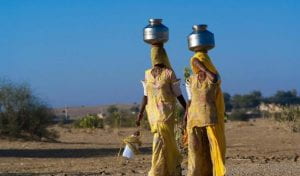To pick up where I left off, I was discussing ecofeminism, what I believe it means from reading articles and pieces of writing from ecofeminists as well as philosophers. Today I wanted to touch on the connection between nature and women in the Global South and why its seen as a problem or a challenge that needs to be tackled and fixed. After discussing this I wanted to discuss some differences in views on ecofeminism, specifically differences in Western and Non-Western perspectives when it comes to the theory of ecofeminism.
Let’s begin…
The Global South is defined as low- and middle-income countries. These countries can be found in Asia, Africa, parts of Latin America, as well as the Caribbean. Throughout these countries, many women are faced with challenges involving water supply. Some of these challenges as mentioned by the united nations include women being responsible for gathering water and losing time, while gathering water and or walking to/using restroom areas they are likely to face attacks, and lastly women dealing with menstruation and pregnancy and having certain needs to maintain hygiene during these times. Death is occurring because of unsanitary water during childbirth. Infections are being found in women because of unsanitary water. With the environmental degradation affecting such a valuable and necessary resource, change is needed to help all, most importantly to help women who I promise you, did not ask for that “time of the month,” or those women who are carrying new life. To step away from the challenges mentioned by the United Nations mostly involving sanitary hygiene and water, some other environmental degradation affecting women is households being destroyed through natural disasters or climate change. Floods, earthquakes, situations like these are unavoidable and leave pressure on women to restore the home or protect the home since women are given the task of being the home caregiver. Floods pollute water and make it unsafe to drink, adding pressure to women to find safer drinking water. Soil erosion causes the land to dry, fish to be without water or in toxic water, and eliminates a food resource for people. Equality needs to be restored to release pressure felt by women to find clean water, to protect the home, to give birth, to just be women. Gender-sensitive approaches are being made to discuss and fix the inequality women are facing due to environmental degradation.
In my previous blog post, I defined ecofeminism and looked at connections to ecofeminism through reading articles and writing pieces by both Hobgood-Oster and philosopher Karen Warren. In this post, I’d like to look at ecofeminism through the eyes of Bina Agarwal. Western ecofeminism looks to restore what was damaged due to patriarchy and environmental degradation. Agarwal mentions the connection to the destruction of nature made by Shiva to third world colonialism. This colonialism has caused damage and brings up inequalities faced in these countries. Agarwal takes the time to talk a lot about women and nature, women and the environment, problems faced by women because of the environment. In comparison to Hobgood-Oster as well as Warren, they focused primarily on a patriarchal system causing inequality for women and connections to women and nature rather than problems faced by women due to nature. I find I am most intrigued by Western views of ecofeminism and want to know more about how these ecofeminists plan to fix oppressions faced by women due to environmental factors that weigh in on their responsibilities in certain countries and how equality will be established to rid women of the pressures that come with these responsibilities.
Agarwal reading:
Water and Gender: The United Nations

Hi!
I like how in-depth you went into the water supply issue that women are facing in the south. it is terrible that something as simple as clean water is so hard to come by for these people, and how much of an effect it has on these women. I would like to see a follow-up article showing if they have made any progress in having clean water and if they have had any changes in equality between the men and women roles of the community.
Hello,
I would like to comment on the hygiene point that you mentioned in your blog. Women in India particularly in villages and rural areas have many hygiene issues. In India according to their culture/religion as they believe in holy basil and plant them in there homes, they can’t build toilets in their home due to which women had to go into the farms which they call “khet” to excrete waste. Women has to face embarrassment and are being harass by men who come there to see those women. This is done near the rivers which pollutes the river affecting both people living near it and the fishes. River water is used for drinking, cooking and other purposes. Polluted water leads to bad health and sometimes death. Apart from toilet issues another issue for women is sanitary issues. Women in rural areas do not have access to sanitary pads but rather during their menstrual cycle they use cloth which they wash after every use and reuse it. Sometimes that one cloth is being used by every other women in the family. This can lead to very serious diseases and urinary infections. Today many villages now have toilets build in their homes but there are still more to be build. Building toilets in the homes protect women’s reputation. This step in India taken by some organizations have helped women and it also helped nature in return. As building toilets means women and men doesn’t need to go to the farm and thus rivers are less polluted therefore, both marine life and women are protected. Also I would like to mention two Bollywood movies, Toilet and Pad man which explain these issue very well and also convey the message of how to deal and solve such issues.